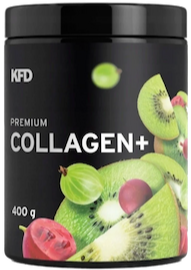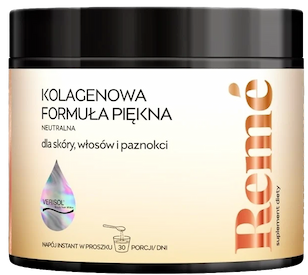Collagen after the age of 30 (levels, supplements, and tips)
Collagen after the age of 30 can stop changes that are already progressing - wrinkles, joint pain or brittle nails.


Learn more about our editorial process
.

Learn more about our editorial process
.

Learn more about our editorial process
.

Learn more about our editorial process
.
Why you can trust us
Articles on Natu.Care are written based on scientific research, data from government websites and other reliable sources. The texts are written in cooperation with doctors, nutritionists and other health and beauty experts. Articles are reviewed before publication and during significant updates.
.Learn more about our editorial process
.Information about advertisements
Content on Natu.Care may contain links to products from the sale of which we may receive a commission. When creating content, we adhere to high editorial standards and take care to be objective about the products discussed. The presence of affiliate links is not dictated by our partners, and we select the products we review ourselves completely independently.
.Learn more about our terms and Conditions
.Tick, tick, tick. The years are flying by and the collagen is getting less and less. By the time you're 30, you've only got 92, 90, or maybe just 79% of your collagen left (depending on how far you are past that age of 30). This is the time when you may be experiencing the first signs of deficiency. You may have woken up this morning and seen the first wrinkles, and felt a mild pain in your joints as you walked down the stairs.
But rest assured! You can remedy this and fill up your collagen counter a little. Collagen supplements will allow you to do just that. That's why, together with clinical nutritionist Julia Skrajda, we present the best formulations and the most important information about collagen.
The following is an overview of the best collagen supplements.
From this article you will learn:
- How are the effects of collagen supplementation. .
- Which collagen supplement is particularly good. .
- How to choose the best collagen supplement. .
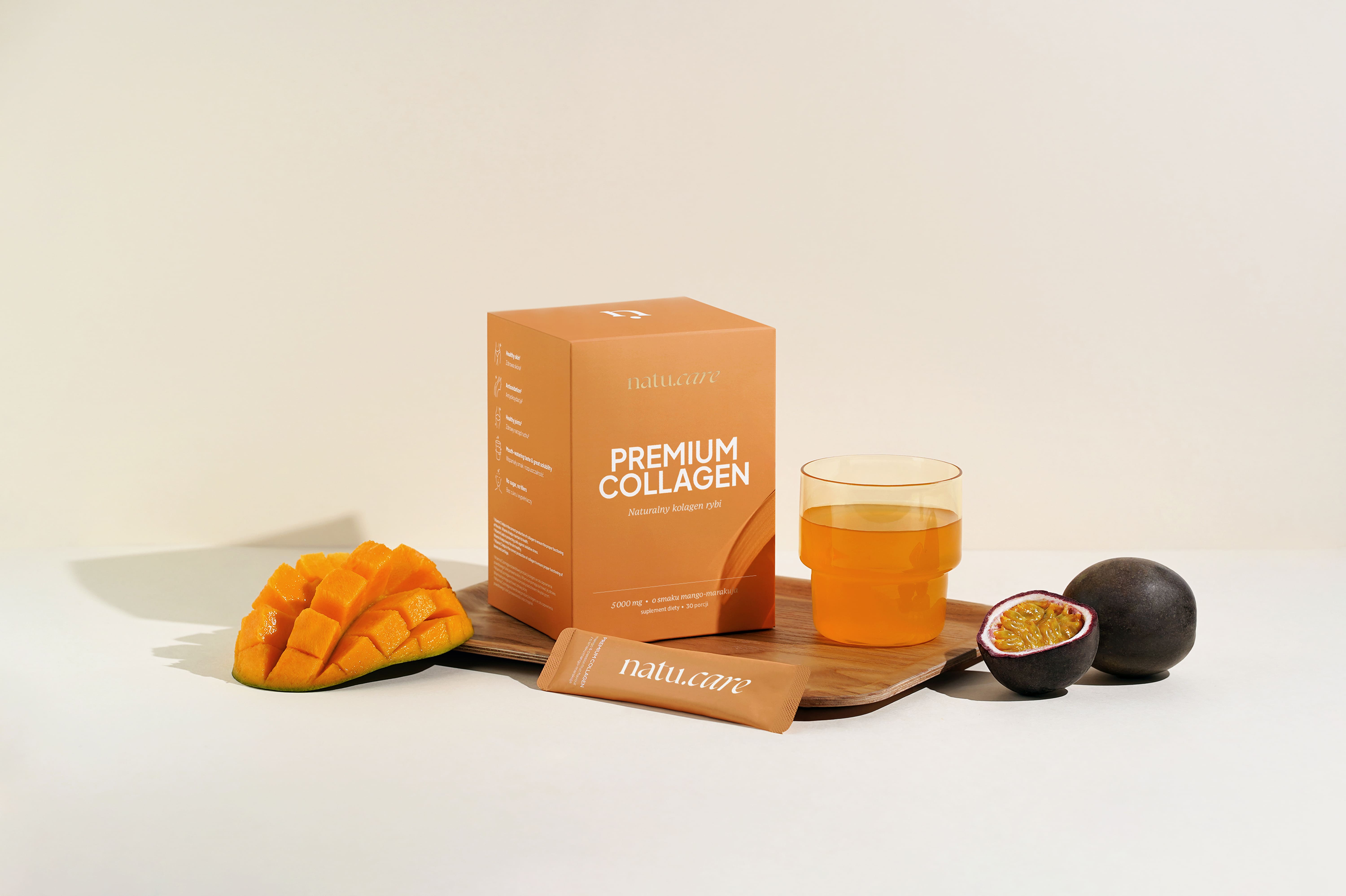
Sprawdź, za co pokochały go tysiące klientek Kolagen Premium 5000 mg, mango-marakuja
Natu.Care Kolagen Premium 5000 mg, mango-marakuja
Natu.Care Kolagen Premium dla zdrowia stawów, skóry, paznokci i włosów. Najlepsza przyswajalność. Optymalna dawka 5 000 lub 10 000 mg. Przebadany przez niezależne laboratorium.
Zobacz więcej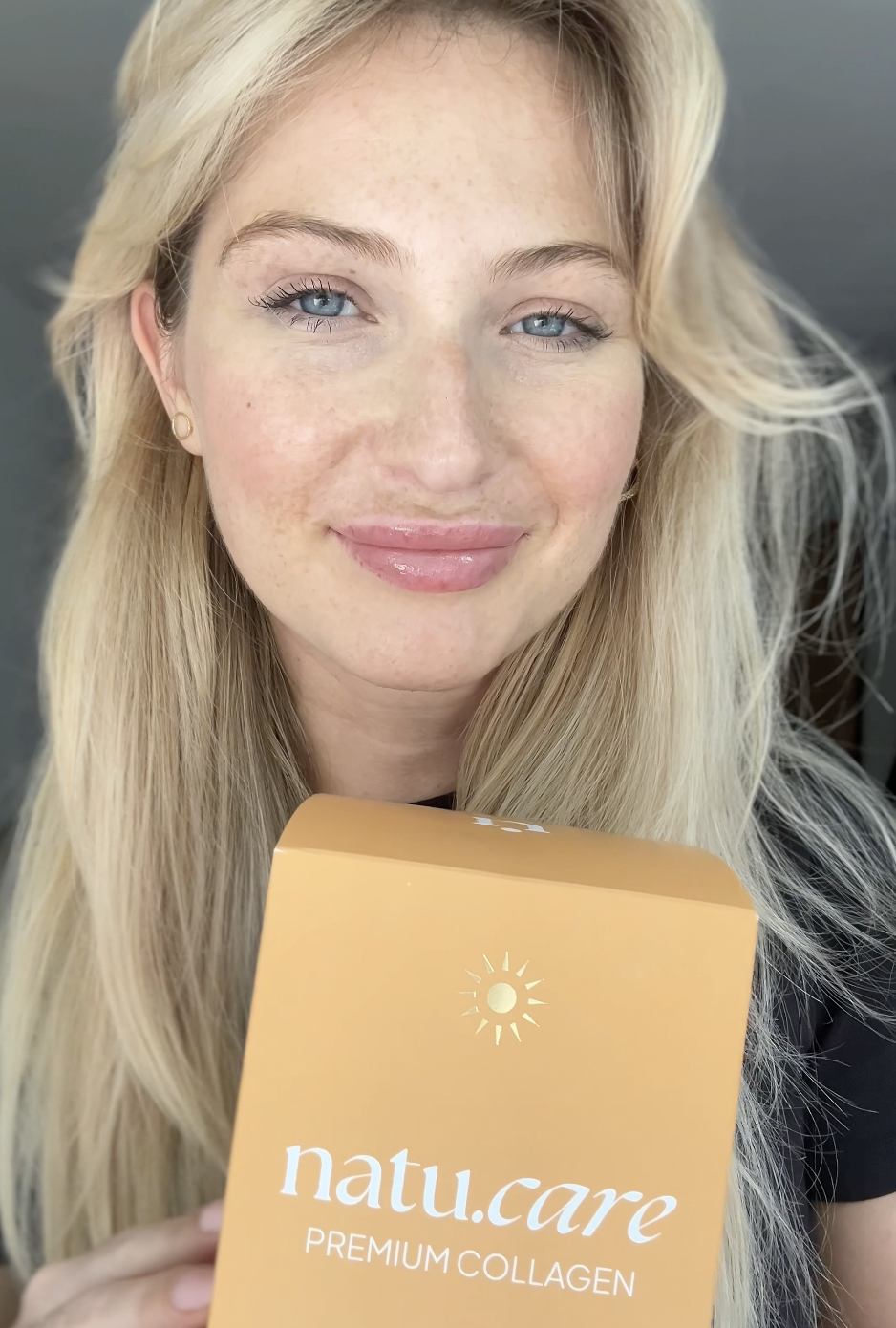
Wybrałam kolagen Natu.Care, ponieważ miał super opinie – a to było dla mnie bardzo ważne! Odkąd go stosuję, moja skóra znacznie się poprawiła i jest nawilżona, a na głowie pojawiły się nowe "baby hair".@Kasia S.
See also:
.
- The best collagen on the market .
- Best facial collagen
- Best collagen for the skin
- Best collagen for joints
- Best collagen for hair
- Best collagen for wrinkles
- Best collagen for cellulite
- Best collagen for acne
- Best collagen for stretch marks
- Best collagen for drinking and collagen for drinking (effects)
What are the effects of collagen supplementation?
.
Collagen, known as the protein of youth, is an important structural protein that is found in skin, hair, nails, joints and connective tissue. Supplementation with collagen can have potentially beneficial effects on health and appearance.
- Improve skin elasticity. Collagen provides elasticity and firmness to the skin. Supplementation can help combat signs of ageing such as wrinkles and loss of firmnessand.
- Hair and nail strengthening. Youth protein can improve the appearance and overall health of hair and nails, reducing the tendency to break .
- Joint support. Collagen helps maintain the structure and elasticity of connective tissues such as cartilage, blood vessel walls, ligaments and tendons. Supplementation can therefore help to reduce joint pain, increase mobility and reduce the risk of injuryand. .
- Influence on digestive health. Studies indicate that collagen may benefit the intestinal mucosa, supporting healthy digestion .
- Bone health. Collagen has a positive effect on bone strength, reducing susceptibility to fracture and lowering the risk of osteoporosisand.
Best collagen after 30 - ranking
.
Natu.Care Collagen Premium 5000 mg, mango-maracuja

- Collagen content: 5000 mg marine collagen hydrolysate
- .
- Additional active ingredients: vitamin C, low molecular weight hyaluronic acid (and L-theanine and coenzyme Q10 in cocoa flavoured collagen or vitamin A and vitamin E in mango–passion fruit flavoured collagen)
- .
- Form: powder sachets
- .
- Dose: 1 sachet per day
- .
- Sufficient for: 30 days
- .
Product description
Fish collagen from the Natu.Care brand in a dose of 5000 mg. The formula contains a sufficient portion of the active substance to positively affect your joints, musculoskeletal system and immunity.
Take care of your tendons, joint cartilage, ligaments, muscles and even bones by supplying them with the building blocks to function properly. Move without bólu and provide the necessary support for any physical activity.
And as a „gratis” to regular supplementation, you will also receive firm skinóhand, healthy and shiny hair and strong nails.
Natu.Care Premium Collagen is available in two flavours – Cacao Bloom and Rise&Shine. Both formulas are based on the following active ingredients: marine collagen hydrolysate, wild roseóbud extract and hyaluronic acid.
Additionally, Cacao Bloom contains natural L-theanine, coenzyme Q10 and defatted Dutch cacao. Rise&Shine instead contains vitamin E and vitamin A.
These are the best collagens in the world.
These best fish collagens on the market also rós taste – Cacao Bloom is a treat for chocolate lovers. Rise&Shine will appeal to those whoóenjoy the refreshing taste of mangoófruit and passion fruit.
Pros and cons
Fish collagen from the Natu.Care brand in a dose of 5000 mg. The formula contains a sufficient portion of the active substance to positively affect your joints, musculoskeletal system and immunity.
Take care of your tendons, joint cartilage, ligaments, muscles and even bones by supplying them with the building blocks to function properly. Move without bólu and provide the necessary support for any physical activity.
And as a „gratis” to regular supplementation, you will also receive firm skinóhand, healthy and shiny hair and strong nails.
Natu.Care Premium Collagen is available in two flavours – Cacao Bloom and Rise&Shine. Both formulas are based on the following active ingredients: marine collagen hydrolysate, wild roseóbud extract and hyaluronic acid.
Additionally, Cacao Bloom contains natural L-theanine, coenzyme Q10 and defatted Dutch cacao. Rise&Shine instead contains vitamin E and vitamin A.
These are the best collagens in the world.
These best fish collagens on the market also rós taste – Cacao Bloom is a treat for chocolate lovers. Rise&Shine will appeal to those whoóenjoy the refreshing taste of mangoófruit and passion fruit.
Additional information
Fish collagen from the Natu.Care brand in a dose of 5000 mg. The formula contains a sufficient portion of the active substance to positively affect your joints, musculoskeletal system and immunity.
Take care of your tendons, joint cartilage, ligaments, muscles and even bones by supplying them with the building blocks to function properly. Move without bólu and provide the necessary support for any physical activity.
And as a „gratis” to regular supplementation, you will also receive firm skinóhand, healthy and shiny hair and strong nails.
Natu.Care Premium Collagen is available in two flavours – Cacao Bloom and Rise&Shine. Both formulas are based on the following active ingredients: marine collagen hydrolysate, wild roseóbud extract and hyaluronic acid.
Additionally, Cacao Bloom contains natural L-theanine, coenzyme Q10 and defatted Dutch cacao. Rise&Shine instead contains vitamin E and vitamin A.
These are the best collagens in the world.
These best fish collagens on the market also rós taste – Cacao Bloom is a treat for chocolate lovers. Rise&Shine will appeal to those whoóenjoy the refreshing taste of mangoófruit and passion fruit.
User review
Fish collagen from the Natu.Care brand in a dose of 5000 mg. The formula contains a sufficient portion of the active substance to positively affect your joints, musculoskeletal system and immunity.
Take care of your tendons, joint cartilage, ligaments, muscles and even bones by supplying them with the building blocks to function properly. Move without bólu and provide the necessary support for any physical activity.
And as a „gratis” to regular supplementation, you will also receive firm skinóhand, healthy and shiny hair and strong nails.
Natu.Care Premium Collagen is available in two flavours – Cacao Bloom and Rise&Shine. Both formulas are based on the following active ingredients: marine collagen hydrolysate, wild roseóbud extract and hyaluronic acid.
Additionally, Cacao Bloom contains natural L-theanine, coenzyme Q10 and defatted Dutch cacao. Rise&Shine instead contains vitamin E and vitamin A.
These are the best collagens in the world.
These best fish collagens on the market also rós taste – Cacao Bloom is a treat for chocolate lovers. Rise&Shine will appeal to those whoóenjoy the refreshing taste of mangoófruit and passion fruit.
Natu.Care Collagen Premium 10000 mg, cherry

- Collagen content: 10,000 mg of hydrolyzed bovine collagen
- Additional active ingredients: vitamin C, low molecular weight hyaluronic acid, glucosamine, chondroitin, extract of Indian frankincense resin (boswellia serrata)
- Form: powder sachets for drinking
- Serving: 1 sachet per day
- Lasts for: 30 days
Product description
One of the strongest collagens on the market, providing as much as 10,000 mg per daily serving. This product can effectively support the condition of joints, skin, hair, and nails.
With this supplement, you will support your skeletal and joint system as well as your beauty, helping you visually halt the aging process and feel rejuvenated!
Pros and cons
Pros:
- The daily portion of collagen is very large – as much as 10,000 mg.
- Proven collagen formula – COLLinstant, whose effectiveness has been confirmed in clinical studies.
- Effective dose of hyaluronic acid, which additionally moisturizes the skin and positively affects joint health.
- Vitamin C supports the body's natural collagen production.
- Glucosamine is a fundamental building block of compounds found in joint cartilage and a component of collagen that gives elasticity to connective tissue in tendons.
- Chondroitin is a natural component found in the human body, mainly in cartilage. This large molecule (mucopolysaccharide) has the ability to absorb water, which helps maintain the elasticity and resilience of cartilage.
- Frankincense resin extract supports blood circulation and joint mobility and reduces their stiffness. It may help alleviate inflammatory conditions.
- The composition has been tested by the independent and accredited J.S. Hamilton laboratory.
Cons:
- None.
Additional information
Users praise Natu.Care Collagen Premium for the easy dissolving of the powder.
ALLDEYNN Collarose Fish
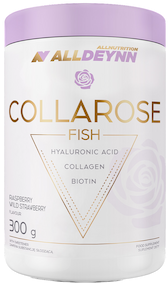
- Collagen content: 5000 mg hydrolysate fish collagen VERISOL F® .
- Additional active ingredients: vitamin C, hyaluronic acid, biotin
- Form: powder to dissolve in water .
- Dose: one scoop (6 g) of powder daily .
- Sufficient for: 50 days .
Product description
Atlantic cod collagen VERISOL F® contained in the formula are easily absorbed collagen peptides of fish origin. Regular supplementation can firm your skinóhand and slow down the ageing process. Your nails will become stronger and stop breaking. The addition of biotin will improve the condition of your hairów. The collagen portion is high enough to also have a good effect on your joints, muscles and bones.
Pros and cons
Atlantic cod collagen VERISOL F® contained in the formula are easily absorbed collagen peptides of fish origin. Regular supplementation can firm your skinóhand and slow down the ageing process. Your nails will become stronger and stop breaking. The addition of biotin will improve the condition of your hairów. The collagen portion is high enough to also have a good effect on your joints, muscles and bones.
Additional information
Atlantic cod collagen VERISOL F® contained in the formula are easily absorbed collagen peptides of fish origin. Regular supplementation can firm your skinóhand and slow down the ageing process. Your nails will become stronger and stop breaking. The addition of biotin will improve the condition of your hairów. The collagen portion is high enough to also have a good effect on your joints, muscles and bones.
Expert and user opinion
Atlantic cod collagen VERISOL F® contained in the formula are easily absorbed collagen peptides of fish origin. Regular supplementation can firm your skinóhand and slow down the ageing process. Your nails will become stronger and stop breaking. The addition of biotin will improve the condition of your hairów. The collagen portion is high enough to also have a good effect on your joints, muscles and bones.
DuoLife Collagen fish collagen 2500 mg
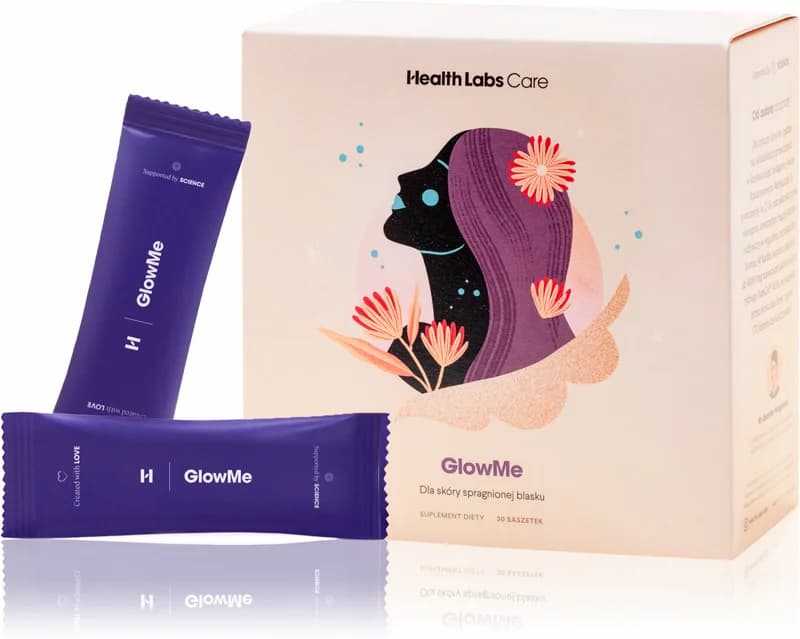
- Collagen content: 2500 mg collagen
- Additional active ingredients: vitamin C, silicon, glucosamine, hyaluronic acid, nettle and bamboo extracts
- Form: liquid to drink .
- Dose:25 ml .
- Sufficient for: 30 days .
Product description
100% natural collagen liquid without unnecessary ingredientsós. The composition of ingredientsós improves the appearance and condition of skinóry, hairów, nails. DuoLife is a good choiceór if you notice the first signs of skinóry ageing or want to stop this process. A tasty liquid, convenient to use.
Pros and cons
100% natural collagen liquid without unnecessary ingredientsós. The composition of ingredientsós improves the appearance and condition of skinóry, hairów, nails. DuoLife is a good choiceór if you notice the first signs of skinóry ageing or want to stop this process. A tasty liquid, convenient to use.
Additional information
100% natural collagen liquid without unnecessary ingredientsós. The composition of ingredientsós improves the appearance and condition of skinóry, hairów, nails. DuoLife is a good choiceór if you notice the first signs of skinóry ageing or want to stop this process. A tasty liquid, convenient to use.
User review
100% natural collagen liquid without unnecessary ingredientsós. The composition of ingredientsós improves the appearance and condition of skinóry, hairów, nails. DuoLife is a good choiceór if you notice the first signs of skinóry ageing or want to stop this process. A tasty liquid, convenient to use.
Pharmovit liquid collagen 10000 mg
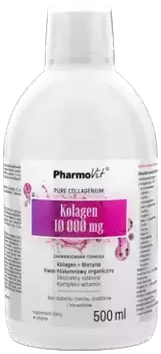
- Collagen content: 10000 mg hydrolysed bovine collagen types I and III .
- Additional active ingredients: hyaluronic acid, natural plant extracts, vitamin C, B vitamins, zinc, vitamin D
- Form: vials .
- Dose: 25 ml .
- Sufficient for: 20 days .
Product description
A solid daily dose of collagen for jointómuscle and bone health and beauty. The duo of collagen and vitamin C has a positive effect on each other, so that „the protein of youth” is better absorbed and more efficiently produced in the body.
Pros and cons
A solid daily dose of collagen for jointómuscle and bone health and beauty. The duo of collagen and vitamin C has a positive effect on each other, so that „the protein of youth” is better absorbed and more efficiently produced in the body.
Additional information
A solid daily dose of collagen for jointómuscle and bone health and beauty. The duo of collagen and vitamin C has a positive effect on each other, so that „the protein of youth” is better absorbed and more efficiently produced in the body.
KFD Premium Collagen+
Product description
High dose of collagen and a real bomb of vitamins C and D and organic sulphur. With this preparation the effects will come immediately. You will improve the firmness of your skin and reduce wrinkles. Your hair and nails will be strong and shiny.
A generous dose of collagen will improve the mobility of your jointsós, benefit your bone system and muscles. Do you do sports and need a product thatós able to keep up with your needs? This product will do the trick.
Pros and cons
High dose of collagen and a real bomb of vitamins C and D and organic sulphur. With this preparation the effects will come immediately. You will improve the firmness of your skin and reduce wrinkles. Your hair and nails will be strong and shiny.
A generous dose of collagen will improve the mobility of your jointsós, benefit your bone system and muscles. Do you do sports and need a product thatós able to keep up with your needs? This product will do the trick.
Additional information
High dose of collagen and a real bomb of vitamins C and D and organic sulphur. With this preparation the effects will come immediately. You will improve the firmness of your skin and reduce wrinkles. Your hair and nails will be strong and shiny.
A generous dose of collagen will improve the mobility of your jointsós, benefit your bone system and muscles. Do you do sports and need a product thatós able to keep up with your needs? This product will do the trick.
Expert opinion
High dose of collagen and a real bomb of vitamins C and D and organic sulphur. With this preparation the effects will come immediately. You will improve the firmness of your skin and reduce wrinkles. Your hair and nails will be strong and shiny.
A generous dose of collagen will improve the mobility of your jointsós, benefit your bone system and muscles. Do you do sports and need a product thatós able to keep up with your needs? This product will do the trick.
Product description
The dietary supplement from Remé contains beef collagen in a patented formula and vitamin C, whichóra aids its absorption. The formula comes in three flavours: neutral, orange-maracuja and strawberry-pomegranate. The formula can effectively support and improve the condition of the skinóry, hairóry and nails.
Pros and cons
The dietary supplement from Remé contains beef collagen in a patented formula and vitamin C, whichóra aids its absorption. The formula comes in three flavours: neutral, orange-maracuja and strawberry-pomegranate. The formula can effectively support and improve the condition of the skinóry, hairóry and nails.
Additional information
The dietary supplement from Remé contains beef collagen in a patented formula and vitamin C, whichóra aids its absorption. The formula comes in three flavours: neutral, orange-maracuja and strawberry-pomegranate. The formula can effectively support and improve the condition of the skinóry, hairóry and nails.
The dietary supplement from Remé contains beef collagen in a patented formula and vitamin C, whichóra aids its absorption. The formula comes in three flavours: neutral, orange-maracuja and strawberry-pomegranate. The formula can effectively support and improve the condition of the skinóry, hairóry and nails.
{ product:1eiyihgASLfslgpBv80Tk1 }}
{ product:3A6Dp6540L63Y3msHqwQCz }}
See also:
.
- Drinking collagen
- Liquid collagen
- Collagen in sachets
- Collagen in tablets
- Collagen in capsules
- Collagen powder
- Lyophilized collagen
- Collagen hydrolysate .
How much collagen is in the body after the age of 30?
.
The human body begins to deplete collagen at the age of 25. The average, annual loss is 1.5% of the body's current youth protein. Therefore, people who are just turning 30 will still have about 92-90% of their collagen. But those who are close to 40 have only 79% of the youth proteinand.
Remember that the specific level of collagen in the body is very difficult to estimate. Age is the main factor that degrades this protein, but there are other aspects that destroy collagen in the body. These include: alcohol consumption, smoking, poor diet or prolonged exposure to sunlightand.
If you have an unhealthy lifestyle, it is likely that your body has been lacking collagen for a long time.
What are the symptoms of collagen deficiency after the age of 30?
.
Collagen deficiency can affect various aspects of your health. The most common symptoms of a lack of this protein in the body includeand:
- Aging skin. Your skin may become dry, thin and lose elasticity. You may also notice more wrinkles, and cellulite will become more prominent.
- The following is an example of this.
- Weakened hair and nails. When the body lacks collagen, hair is brittle, thin and weak. In turn, nails grow more slowly and also break more easily. .
- Joint pain. If you experience joint pain when you move, it may be a symptom of a deficiency of collagen, which affects the flexibility and strength of the joints. .
- Immune system problems. Collagen plays a key role in the proper functioning of the immune system. If you've been getting sick more often in recent weeks, it's possible you're lacking collagen.
Hydrolysed vs freeze-dried collagen - which is best after 30?
.
You may come across two popular types of youth protein on the market - freeze-dried and hydrolysed collagen. The table below will dispel all your doubts and allow you to choose the better solution.
.
|
Hydrolysed collagenand |
|||
|
Manufacturing process |
Hydrolysis is the process by which collagen molecules are broken down into smaller fragments known as collagen peptides. This makes the hydrolysed form more easily digestible and assimilable. |
Liophilisation, or sublimation drying, involves removing water from biological material by freezing and then sublimating the water (i.e. from ice straight into steam). As a result, freeze-dried collagen has a longer shelf life and is more stable. |
|
|
Palatability |
Through hydrolysis, hydrolysed collagen is easily absorbed by the human body, which can contribute to faster and better results. |
Hydrolysed collagen is easily absorbed by the human body, which can contribute to faster and better results. |
Liophilised collagen may be less bioavailable compared to hydrolysed collagen, meaning that the absorption process by the body may be slower. |
|
Solubility . |
Hydrolysed collagen is readily soluble in a variety of liquids, making it easy to consume. |
Liophilised collagen tends to form lumps more quickly, making it more difficult to dissolve in liquids. |
|
|
Price |
Hydrolyzed collagen is widely available, so relatively inexpensive products can be found. |
Liophilised collagen is less common than hydrolysed collagen, so it is usually more expensive. |
Summary
.
Hydrolysed collagen has better bioavailability, faster solubility and often a lower price than lyophilised collagen. On the other hand, freeze-dried collagen is more spatially and temporally stable. The choice between these two forms of collagen depends on individual needs and preferences.
It is difficult to determine which collagen is better. There is still a lack of studies comparing lyophilisates with hydrolysates. Nevertheless, I recommend hydrolysed collagen to my clients. It is better absorbed and usually slightly cheaper, as well as being more readily available..
 .
.
Ilona Krzak Master of Pharmacy
.
Why is fish collagen better than bovine collagen for people over 30 years of age?
.
Fish collagen and bovine collagen are the two most popular types of collagen supplements. Occasionally you may also come across porcine collagen, but this is rare and has similar properties to beef collagen. So why is fish collagen best for people over 30?"
.
- Lower bioavailability. Fish collagen has a lower molecular weight, making it more easily absorbed by the body. Studies suggest that it is absorbed up to 50% better than beef or pork collagen. As a result, marine collagen may be more effectiveand.
- Higher concentration of type I collagen. Fish collagen has a very high content of type I collagen, which is the most common type of collagen in the body. Type I collagen is important for skin, hair, nails and bonesand. .
- Safer. Compared to beef collagen, fish collagen is less allergenic, making it a more common choice for people with food allergies. Beef collagen can cause allergic reactions in people sensitive to animal products. Furthermore, there is also a risk of contracting animal-borne diseases with beef collagenand. .
- Ecology. Fish collagen can be sourced from wild-caught fish, which contributes to sustainabilityand. .
- Pescowegetarian. For people who avoid meat but eat fish, fish collagen may be the only solution to provide the body with this proteinand. .
What collagen to choose after 30 years of age?
.
When choosing a collagen supplement after the age of 30, it is worth considering the following criteria:
- Quantity of collagen. Research shows that the most effective products contain between 2.5 and 15 grams of hydrolysed collagen. Content below this range will be inadequate, and above it will be unnecessaryand. .
- Purity of formulation. Optimal collagen supplements have no preservatives or other fillers in their formulation. Don't forget that what appears on the label goes into your body.
- Additional active ingredients. Look out for vitamins and minerals that support collagen synthesis. Particularly important is vitamin C, which aids in the body's absorption and production of collagen.
- Take note.
- Laboratory testing. The quality of the composition should be confirmed by independent, accredited laboratories.
- Form of administration. Collagen in cream form does not produce real effects on the skin - see below for more information. But the choice between collagen powder, liquid, capsules and tablets is yours.
- Origin of collagen. Some suppliers source collagen from wild caught fish that have lived in the wild (rather than in farms). Such supplements are characterised by concern for the environment and animal welfare. .
- Taste. Seemingly a small thing, but nevertheless important to have the motivation to supplement regularly. Here you can see the full criteria. .
Is it worth using collagen creams?
.
No. Despite manufacturers' assurances that their collagen creams rejuvenate the skin, they don't actually work.
The size of collagen molecules prevents them from reaching the deeper layers of the skin. Collagen does have a beneficial effect on skin hydration and firmness, but the results are only superficial. The smooth and soft feeling on the skin after the application of a collagen cream is illusory. In practice, no benefits translate to the dermis.
Collagen applied externally, for example in a cream, does not produce the effects that manufacturers promise us. These creams do not rebuild the worn-out collagen in the skin, but only form a protective layer on our skin. The smoothing and moisturising effects are only superficial smoothness, as collagen is too large a molecule..
 .
.
Witold Tomaszewskidoctor of medical sciences
.How to supplement collagen after the age of 30?
.
Collagen, like any other supplement, should be taken as recommended by the manufacturer, doctor or pharmacist. Always, before starting supplementation, check the dosage and any contraindications, as they may vary from product to product.
Collagen excess is very rare and it is usually not possible to overdose on this protein from supplements. Nevertheless, it is possible to take an excessive dose of other nutrients (e.g. vitamins or minerals found as additives in collagen supplements).
Overdose.
After how long will I see the effects of taking collagen?
.
You may notice the first effects of drinking collagen or taking it in capsule form after about 8-24 weeks of regular supplementation. The specific timing is difficult to estimate, as it depends on your body.
When it comes to the length of supplementation, there are no limits. You can supplement with collagen continuously. Besides, why go back to brittle nails and wrinkles? Well, that's exactly it.
Contraindications to using collagen after the age of 30
.
Collagen is a safe protein that occurs naturally in the body. Despite this, not everyone can take it.
Collagen contraindications after the age of 30 areand:
.
- .
- pregnancy and breastfeeding period, .
- allergies to the ingredients in the preparation, .
- gastrointestinal problems, .
- selected skin disorders,
- diseases of the skin.
- kidney and liver diseases, .
- adherence to selected medications, .
- some autoimmune disorders, .
Can there be side effects with collagen supplementation after the age of 30?
.
Yes, but they are rare and usually very mild. Some include allergic reactions such as skin rashes, itching or swelling. Others include stomach complaints - bloating or nausea. In most cases, side effects with collagen supplementation subside once it is discontinued.
Is collagen vegan?
.
No, despite the fact that you may come across many products on the market advertised as 'vegan collagen'. In fact, these are dietary supplements that contain the collection of amino acids that make up collagen, but not collagen itself.
No.
Scientific work is, however, underway on collagen that is genetically modified from yeast and bacteria. Other specialists are attempting to produce a youth protein from rice or bamboo.
These are preliminary efforts.
This is, however, preliminary work that requires additional confirmation.

Sprawdź, za co pokochały go tysiące klientek Kolagen Premium 5000 mg, mango-marakuja
Natu.Care Kolagen Premium 5000 mg, mango-marakuja
Natu.Care Kolagen Premium dla zdrowia stawów, skóry, paznokci i włosów. Najlepsza przyswajalność. Optymalna dawka 5 000 lub 10 000 mg. Przebadany przez niezależne laboratorium.
Zobacz więcej
Wybrałam kolagen Natu.Care, ponieważ miał super opinie – a to było dla mnie bardzo ważne! Odkąd go stosuję, moja skóra znacznie się poprawiła i jest nawilżona, a na głowie pojawiły się nowe "baby hair".@Kasia S.
See also:
.
- The most powerful collagen .
- Properties of collagen
- Best absorbed collagen
- Natural collagen
- When to drink collagen
- Collagen contraindications
- How to supplement collagen .
- How to rebuild collagen .
- Collagen for athletes
- Collagen type 1, type 2 and type 3
- Fluid collagen
- What destroys collagen in the body .
Summary
.
- At the age of 30, you may notice the first signs of collagen deficiency.
- Collagen is the most important nutrient in the body.
- Collagen supports the health of skin, joints, hair, nails and muscles. .
- Collagen supplementation can delay the ageing process and prevent, for example, wrinkles or joint pain. .
- Hydrolysed collagen is a better option than freeze-dried. .
- Fish collagen is absorbed up to 50% faster than bovine collagen. .
- Side effects of collagen supplementation are rare and mild. .
FAQ
.What products support collagen absorption?
.Collagen is best absorbed in combination with vitamin C. In addition to this, other vitamins and minerals such as:
are also required for the absorption and production of collagen.- zinc, .
- copper, .
- organic sulphur (MSM), .
- manganese, .
- vitamin A, .
- vitamin E, .
Can excess collagen be harmful?
.Yes, however, it occurs rarely and is caused by inadequate supplementation or disease.
Symptoms collagen excess include:
- thickening of the skin, .
- digestive problems, .
- diarrhea, .
- congestion, .
Where can collagen be found?
Collagen is found in abundance in products such as:
- bone broth, .
- gelatin, .
- gelatin, .
- fish (especially the skin),
- seafood
- seafood (fish, shellfish), .
Collagen is not found in fruits and vegetables, but they provide vitamins and minerals necessary for its production (e.g. vitamin C).
Can collagen supplementation cause side effects?
.Rare side effects of collagen supplementation include feeling full, heartburn and allergies. Make sure you choose quality formulations, and if you experience adverse symptoms, consult your doctor and consider changing your supplement or stop taking it.
How long can collagen supplements be used?
.Collagen can be used long-term to maintain the desired effects. Supplementation is safe and beneficial to health. As natural collagen production declines with age, regular supplementation can help maintain youthful skin, healthy hair, nails and joints.
Is collagen found in fruit and vegetables?
.Collagen is not found in fruit and vegetables, as it is an animal protein. However, they are valuable in the synthesis of collagen in the body. Consume vitamin-rich fruits such as citrus, kiwi or strawberries, and vegetables such as peppers, broccoli or spinach.
Does collagen have a rejuvenating effect?
.Yes, collagen can help with the rejuvenation process. Use its properties to improve the elasticity of your skin, reduce wrinkles and hydrate your complexion. Collagen can also help improve bone density and muscle strength and volume.
Regularly take collagen supplements or consume collagen-rich foods such as bone broths and jellies. Support the effects with a healthy diet, hydration and regular physical activity.
.
Resources
.See all
.Proksch, E., Schunck, M., Zague, V., Segger, D., Degwert, J., & Oesser, S. (2014). Oral intake of specific bioactive collagen peptides reduces skin wrinkles and increases dermal matrix synthesis. Skin Pharmacology and Physiology, 27(3), 113-119. https://doi.org/10.1159/000355523
Reilly, D. M., & Lozano, J. (2021). Skin collagen through the lifestages: Importance for skin health and beauty. Plastic and Aesthetic Research, 8, 2. https://doi.org/10.20517/2347-9264.2020.153
Kahan, V., Andersen, M. L., Tomimori, J., & Tufik, S. (2010). Can poor sleep affect skin integrity? Medical Hypotheses, 75(6), 535-537. https://doi.org/10.1016/j.mehy.2010.07.018
Fisher, G. J., Quan, T., Purohit, T., Shao, Y., Cho, M. K., He, T., Varani, J., Kang, S., & Voorhees, J. J. (2009). Collagen Fragmentation Promotes Oxidative Stress and Elevates Matrix Metalloproteinase-1 in Fibroblasts in Aged Human Skin. The American Journal of Pathology, 174(1), 101-114. https://doi.org/10.2353/ajpath.2009.080599
agoda MD, M. R., & Gans PhD, E. H. (2012). A Nutritional Supplement Formulated with Peptides, Lipids, Collagen and Hyaluronic Acid Optimizes Key Aspects of Physical Appearance in Nails, Hair and Skin. Journal of Nutrition & Food Sciences, s5. https://doi.org/10.4172/2155-9600.S5-002
Kujala, U. M., Kaprio, J., & Sarno, S. (1994). Osteoarthritis of weight-bearing joints of lower limbs in former elite male athletes. BMJ, 308(6923), 231-234. https://doi.org/10.1136/bmj.308.6923.231
Moskowitz, R. W. (2000). Role of collagen hydrolysate in bone and joint disease. Seminars in Arthritis and Rheumatism, 30(2), 87-99. https://doi.org/10.1053/sarh.2000.9622
Yes, Y. J., Kim, Y. J., Lee, J. G., Yi, Y.-H., Cho, Y. H., Kang, G. H., & Lee, S. Y. (2019). Effect of Oral Ingestion of Low-Molecular Collagen Peptides Derived from Skate (Raja Kenojei) Skin on Body Fat in Overweight Adults: A Randomized, Double-Blind, Placebo-Controlled Trial. Marine Drugs, 17(3), 157. https://doi.org/10.3390/md17030157
Ueno, R., Takaoka, Y., Shimojo, N., Ohno, F., Yamaguchi, T., Matsunaga, K., & Kameda, M. (2020). A case of pediatric anaphylaxis caused by gummy tablets containing fish collagen. Asia Pacific Allergy, 10(4), e35. https://doi.org/10.5415/apallergy.2020.10.e35
Hu, Z., Yang, P., Zhou, C., Li, S., & Hong, P. (2017). Marine Collagen Peptides from the Skin of Nile Tilapia (Oreochromis niloticus): Characterization and Wound Healing Evaluation. Marine Drugs, 15(4), Article 4. https://doi.org/10.3390/md15040102
Collagens of marine origin and their potential applications-PMC. (n.d.). Retrieved 14 April 2023, from https://www.ncbi.nlm.nih.gov/pmc/articles/PMC4278207/
Marine Collagen from Alternative and Sustainable Sources: Extraction, Processing and Applications-PMC. (n.d.). Retrieved 17 April 2023, from https://www.ncbi.nlm.nih.gov/pmc/articles/PMC7230273/
Silva, T. H., Moreira-Silva, J., Marques, A. L. P., Domingues, A., Bayon, Y., & Reis, R. L. (2014). Marine Origin Collagens and Its Potential Applications. Marine Drugs, 12(12), Article 12. https://doi.org/10.3390/md12125881
Jelonek, L. (2023). Collagen. Everything you need to know (B. Turczynski, ed.; 1st ed.). Natu.Care. https://books.google.com/books?vid=9788396887801
..
Editorials
Meet the team


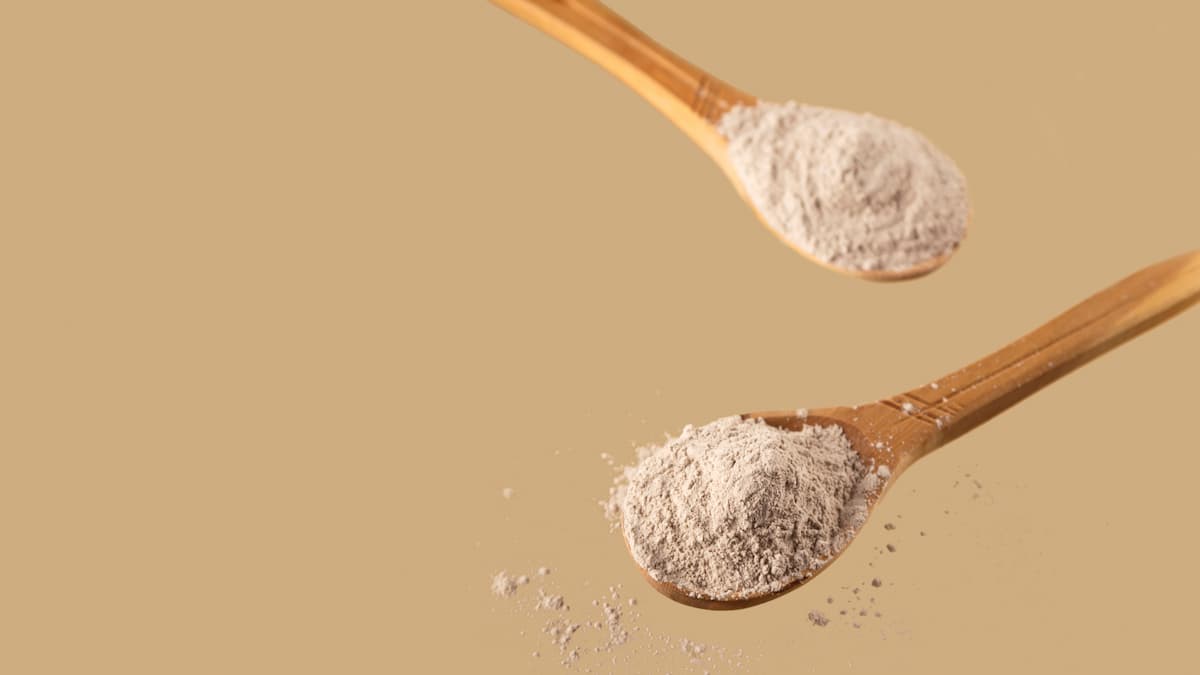
Everything you want to know about COLLinstant collagen.

Collibre collagen is an interesting supplement in shot form.
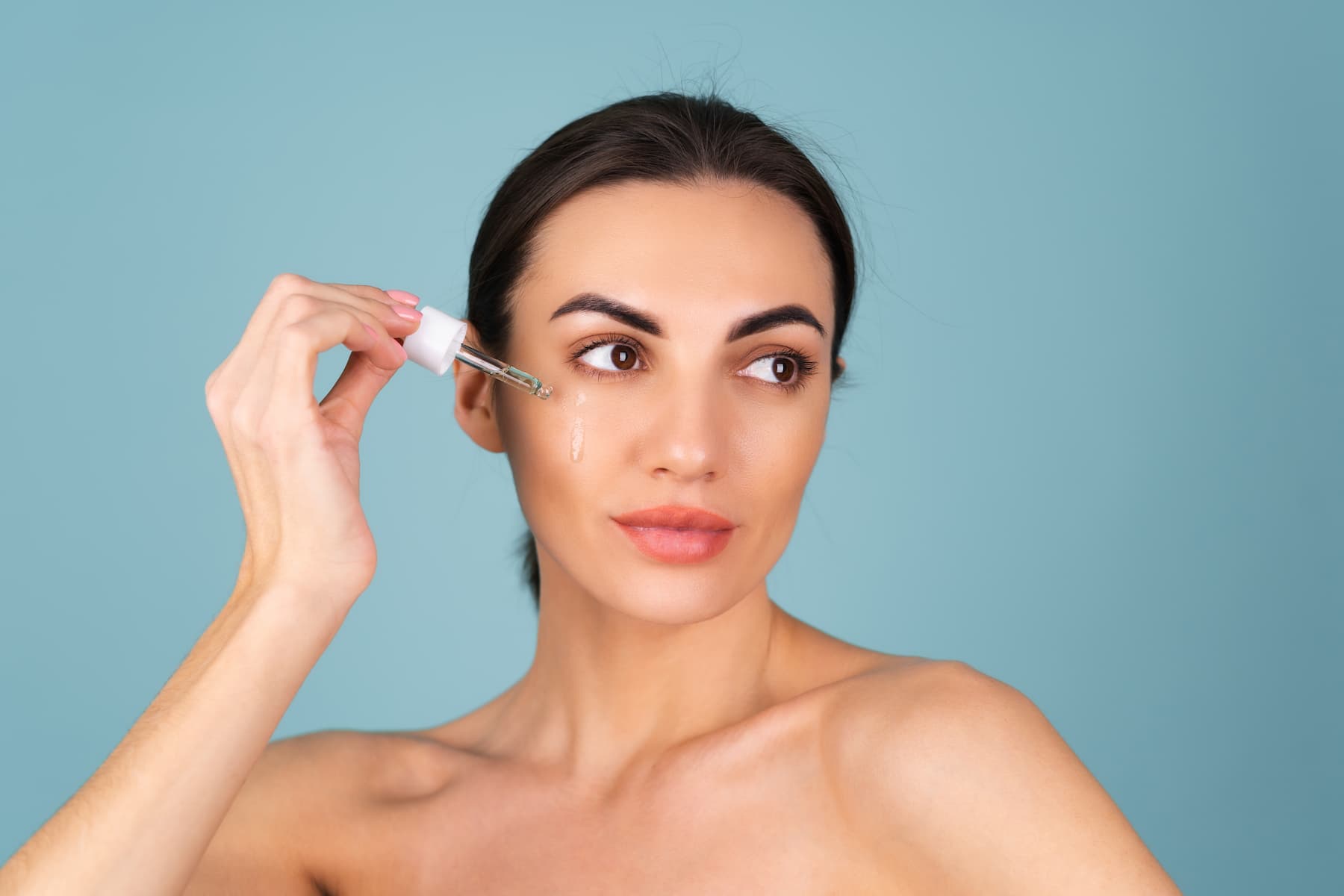
Solgar collagen with hyaluronic acid is a dietary supplement that supports skin and joint health.
